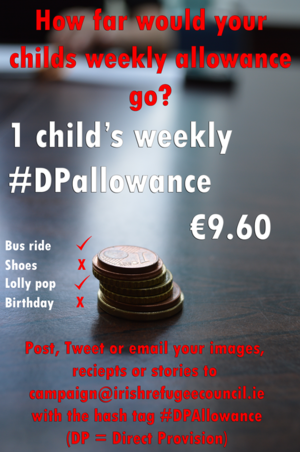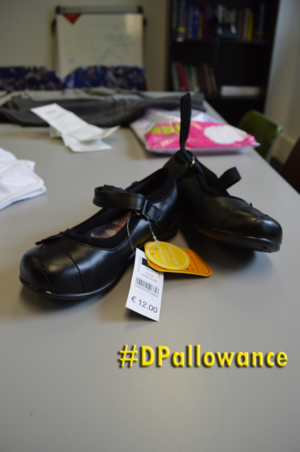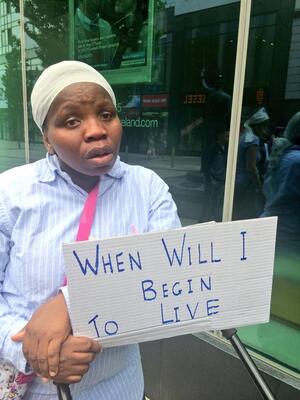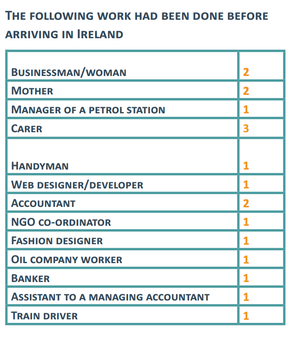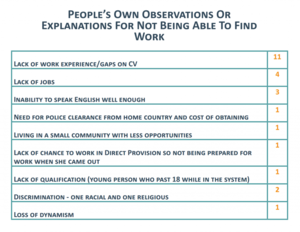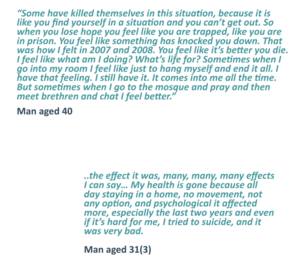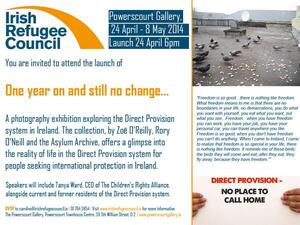This morning.
In Committee Room 2 in Leinster House.
Members of the Irish Refugee Council and Movement of Asylum Seekers in Ireland (MASI) – including Lucky Khambule and Bulelani Mfaco – are appearing before the Oireachtas justice committee.
They are discussing direct provision and the international protection process.
Just yesterday, the Ombudsman Peter Tyndall said direct provision centres are unsuitable for longer-term occupation and called for a formal resettlement programme to be put in place.
At the end of his opening contribution, Mr Mfaco said:
“We are human beings, like everyone, like all of you. All we ask is that we be treated as such. The very fact that people have to ask the Government to treat them humanely should shame all of you.”
UPDATE:
Donnah Vumah, of MASI, told the committee that there is a dearth of mental health services available to people living in direct provision.
She said the “only thing there at the moment” are posters in the centres telling people they can contact The Samaritans or Spirasi (an organisation which helps survivors of torture who are asylum seekers, refugees, or other disadvantaged migrant groups).
However, Donnah said securing an appointment with Spirasi requires asylum seekers to get that appointment through a referral from a solicitor or from a GP and that usually takes a “very long time”.
She added:
“This is why we find that a lot of people tend to turn to things like sleeping tablets or alcohol, they develop a lot of addictions such as gambling addictions because they are trying to find a way to cope with living in that situation.”
Lucky Khambule told the committee that the number of suicide attempts in direct provision centres has increased in the past 18 months.
He said last year alone there were five deaths in direct provision.
He said some of these deaths concerned individuals with mental health issues while some were using sleeping tablets.
“We feel this is not qualified obviously, that the provision of the tablets, in terms of addressing the mental health issue, is the wrong one. The psychological traumas that people do face in direct provision are the things that need to be addressed in a very, very serious way.
“Otherwise we will see more deaths happening in direct provision because we ignore the signs that are there on mental health issues.”
MASI member Tinda Ndlovu told the committee that she and her three children live in Direct Provision.
She said that her eldest child, aged nine, has previously said to her:
“Sometimes when I feel sad, I feel like kiling myself.”
Mr Mfaco, who is gay and living in Knockalisheen Direct Provision Centre in Clare, spoke about homophobic slurs that he has received at the centre.
He said he doesn’t trust anyone in the centre and when he goes to eat in its canteen, he will sit somewhere with his back against the wall as he doesn’t feel comfortable.
He added:
“You have staff members in direct provision who also undermine privacy for individuals.
“I was sitting in my room one day and they knocked once and they opened the door. It’s a lady who worked in Knockalisheen. She knocked once, she opened the door and I was sitting in my room getting ready to go and have a shower.
“So obviously I had my underwear on.
“The next time it happened it was a manager in Knockalisheen direct provision centre who walked into the men’s showers, in the men’s block…She opened the door in the men’s showers, she looked, and then she closed the doors and said ‘sorry’ as she walked away.
“It’s a man’s shower. What are you expecting to see there? Like privacy means nothing to them.”
“We’ve had similar incidences in Hatch Hall Direct Provision Centre and in Balseskin Direct Provision Centre [both in Dublin] where either a staff person walks into a room where a person is naked or another resident walks into a room and the person is naked.”
“We’ve had experiences from children who feel unsafe in the way that men look at them, creepily, it’s been reported in the news.
“…women who feel unsafe sharing those intimate living spaces with other people because a lot of the women, some of them would have suffered torture or sexual violence and to be placed then in a position where you feel you’re unsafe again becomes very cruel.”
Mr Mfaco also spoke about the sexual exploitation of some people living in direct provision.
He said:
“When people aren’t allowed to work legally, it creates then the openness for whoever wants to exploit them to actually do… and we’ve had people who come to MASI who work from 7am in the morning until 5pm and they are only paid €25 to €27.
“It becomes very difficult then for a person to live a normal life because they don’t have a sense of what their rights are once they are actually given permission to leave – they might just continue with that exploitation.
“We’ve also had people being offered money for sex in direct provision.
“Because people know that there are people who are getting paid €21.60 per week, it’s now €38.80, and you have to live.
“I’ve been offered money for sex, there are children who’ve been offered money for sex, there are women who’ve been offered money for sex.
“So it becomes very, the exploitation, we don’t know to what extent that it is happening but we have reports from our work and other people.”
Christopher Sibanda, who has lived in a direct provision centre in Waterford for the past three years and travels to Dublin for college every day – therefore spends six hours on the road – told the committee that he shares a room with three other men.
He said the room is four metres long by four metres wide.
He said he would invite any politician to join him and a spend a night in his centre to see what life is like in direct provision.
He said:
“In that same environment, in that same centre, Viking House, there is no area where if you come today and visit me, where you can sit and talk to me, just greet me. There is none.
“That is not human living.
“The jailer-prisoner attitude that pervades there is not for human beings.
“…the treatment by the centre managements, I don’t know what is in place by RIA [Reception Integration Agency] that has been put in place for training of the people that work there because they do have the feeling that they are jailers there and that we are prisoners.
“And that they are doing favours for us.
“From the kitchen staff – you get people being thrown with plates of food. Some times those plates will fall and people will laugh.
“That happens to human beings [inaudible] who will be in a queue by the way and you will then beg for food.
“If you happen to miss a meal, you miss a meal, you know you’ve missed a meal, you can come back, the same food that has not been served because I missed meal obviously, there will be leftovers, cannot be served to me because I’m out of meal time.
“That is not human.”
Mr Sibanda also said he cannot take a lunch from the centre with him when he leaves for college.
Mr Mfaco also spoke about how many children and adults “warehoused” in direct provision centres are prevented from integrating in Irish society and, in fact, “segregated” from Irish people.
He said:
“Like when you go, get off the bus in Limerick city centre. You see all these brown people, you actually see Irish people staring at us and going ‘where did this bus come from?’
“It has brown people. They don’t look like, they look different, it only has them.
“Everybody knows it’s from a direct provision centre.
“When the bus shows up at the school. Some of the school kids are ashamed, of their friends to know, but everybody knows that that school bus is going to take them to a direct provision centre.”
Mr Mfaco said it’s a similar situation for adult asylum seekers when they go to their local Post Office to collect their weekly allowance.
“Everybody in the queue, everybody in the Post Office staff, know that that person lives in a direct provision centre.
“…you’re constantly reminded of how bad your life is, and you’re constantly reminded that you are not considered part of Irish society. You’re divorced from social life, you can’t really socialise on €38.80 while you’re living in Mount Trenchard [Limerick], there is no public transport.
“There is no public transport in Knockalisheen and other direct provision centres as well.”
He later added:
“We get called ‘welfare scroungers, fee loaders. We’ve had, in the election campaign, we’ve been called freeloaders, we never asked.
“When an asylum seeker came to Ireland, they never asked the Irish Government for a plate of food. Nobody arrives at Dublin Airport and says ‘I’d like to have food please’.
“So when you tell me that you’re providing me with food, I never asked for any of that, I asked for protection.
“So it becomes very difficult to even begin to talk about integration for us when we have people being warehoused in direct provision centres without access to very basic everyday things.”
The meeting can be watched in the video link above and here.
Previously: In Direct Provision For 14 Years









